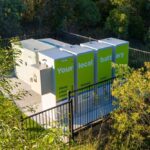Why Energy Storage Matters for Off-Grid Living
Off-grid living has become increasingly popular as people seek greater independence and self-sufficiency. However, relying on the grid can be a significant challenge, especially for those living in remote areas or with limited access to infrastructure. Energy storage solutions are crucial for off-grid living, providing a reliable source of power and reducing reliance on external energy sources. In this guide, we’ll explore the importance of energy storage for off-grid living and present the top options for storing energy.
Type of Energy Storage Systems
There are several types of energy storage systems available, each with its unique characteristics, advantages, and disadvantages. Here are some of the most popular options:
Battery-Based Energy Storage Systems
Battery-based energy storage systems use rechargeable batteries to store excess energy generated by solar panels or wind turbines. This type of system is ideal for off-grid living as it allows homeowners to store energy generated during the day for use at night or during power outages.
Compressed Air Energy Storage (CAES)
CAES systems involve compressing air in underground caverns during off-peak hours and releasing it to generate electricity during peak demand. While not as common as battery-based systems, CAES is a viable option for large-scale energy storage.
Pumped Hydro Storage (PSH)
PSH systems use excess energy to pump water from a lower reservoir to an upper reservoir during off-peak hours. The stored water is then released to generate electricity during peak demand. PSH is a cost-effective and efficient option for large-scale energy storage.
Benefits of Energy Storage
Energy storage offers numerous benefits for off-grid living, including:
Increased Energy Independence
Energy storage allows homeowners to store excess energy generated by their solar panels or wind turbines, reducing reliance on the grid and providing greater energy independence.
Reduced Energy Costs
Energy storage can help reduce energy costs by shifting consumption to off-peak hours, when energy is cheaper and more abundant.
Improved Power Quality
Energy storage can help stabilize the grid by providing backup power during outages and improving power quality.
FAQs
Q: What are the most common types of energy storage systems for off-grid living?
A: The most common types of energy storage systems for off-grid living are battery-based energy storage systems, compressed air energy storage (CAES), and pumped hydro storage (PSH).
Q: How do I choose the right energy storage system for my off-grid home?
A: To choose the right energy storage system, consider factors such as your energy needs, budget, and available space. Consult with a professional to determine the best solution for your specific situation.
Q: Can energy storage systems be used for backup power during outages?
A: Yes, energy storage systems can provide backup power during outages, helping to ensure a reliable supply of energy.
Conclusion
In conclusion, energy storage is a crucial component of off-grid living, providing a reliable source of power and reducing reliance on external energy sources. By understanding the different types of energy storage systems and their benefits, homeowners can make informed decisions about their energy needs and choose the best solution for their situation. Whether you’re considering off-grid living or simply looking to reduce your energy reliance, energy storage is an essential consideration.


.png?w=150&resize=150,150&ssl=1)
.png?w=150&resize=150,150&ssl=1)



.png?w=150&resize=150,150&ssl=1)